 |
| Photo by Wesley Eller; https://creativecommons.org/licenses/by/2.0/ |
This essay is an expansion of my earlier imitation essay and post, "Fill me with Loneliness, Drink it as Love."
The Reality of Love as the Potential for Loneliness
It fills every silent corner and rolls across each room like the booming ticks of a small mantle clock. Frightening, pervasive, indelible, and ever-stalking the peace of solitude. How is it possible that nobody else notices it? It must be just me. If I'd not grown up in the cacophonous hubbub of pattering feet, wrestling limbs, and chattering voices, or if I had simply taken more time when I had time, I wouldn't feel it either.
It highlights the pictures of family members I haven't seen in months. It feeds off of white noise making my situation more obvious. It dredges up memories that I wish weren't so distant. It paints brilliant hypotheticals that I can only imagine I'm missing.
It isn't homesickness; the place I grew up is only the canvas of my contented existence. It is more than that. It distances me from familiar faces, close conversations, family jokes, company. Hard times, yellowed memories, happy times, youthful escapades. It proves to me that acclimating to a location is not nearly as powerful as acclimating to a soul.
It's loneliness, and I am really good at it.
Where does it come from? I'll tell you where it comes from. Everywhere. From the fact that Spencer is working late tonight, unable to help chase it away. From the fact that I just got off a phone call with words that couldn't be spoken in person. From empty evenings brimming with homework instead of siblings' orchestra concerts, soccer games, first words, and story time—I tell myself that it's okay, I'll make up lost time, I won't be so busy and isolated for much longer. It comes from having responsibilities that I can't ignore till I'm abandoned by any company because I first abandoned them. It comes from sitting silently wishing someone would knock on the door, going to sleep alone, waking alone, walking alone, thinking alone.
It comes when I realize that my siblings are growing up and I'm not there. When "Hey, it's Natalie!" becomes a frequent reference to a calling device instead of my face. When me coming home is an occasion and not the everyday. It comes when I remember that my five-year-old brother cried in a corner outside the temple because he thought my wedding meant he'd never see me again. I held him and whispered promises; I prayed because I felt the gaps of time chasing me down. It comes when another brother tries not to cry when I leave, or a sister clutches me saying, "call me, we'll figure out what to talk about." When I say I'll teach her to crochet someday, or I'll read him Harry Potter, that I'll teach her French, we'll analyze Lord of the Rings, talk about boys, play frisbee, go on walks, go shopping, go to a movie, go on a double date, practice yoga, learn to draw, stargaze from the roof, roast s'mores, or sit and do nothing.
Oh wait, I don't have time to do nothing, no matter how important, I'm too busy being laboriously lonely.
Sometimes I am a well of loneliness. I can dig into my soul like deep earth and etch out the regrets of all that I'm missing. But, loneliness is surprisingly similar to love. And, though I'm good at loneliness, the imprint on my being while a void to me, houses love for others. I fill up my cavity with water to share. Each voicemail, each letter, each picture might fill me with loneliness, but I drink it as love. Some youngest siblings may tell you that they were always alone or that their older siblings didn't care. Not my siblings. Phone calls and letters. Skype and short visits. Ongoing texts full of riddles, ongoing conversations full of to-be-continued. And how do you think I feel about that?
Give you one guess.
~~~❋~~~
Till experienced, loneliness and love are quite different. But, in fact, they are nearly the same, causal even. I began to understand the correlation by understanding how I love and how I am lonely. When I love someone, my physical and emotional state shifts. I seem to create a pocket in my heart like a labeled cubby hole in a preschool classroom.
Every person I love has a cubby hole, and each is labeled with the colors and qualities of their existence. The more time love spans, the more knick knacks go into their cubby hole. You would think my heart would fill up, but it doesn’t. It just expands. Thus love potentially begets loneliness exponentially. The more expanded my heart, the more likely someone will be missing, and I will be left empty. It’s really just probability, as the reality of love increases so does the potential for loneliness, even though that sounds relatively impersonal considering the emotional energy and intimate connection involved in such a process.
I’ve often wondered if loving less may be the antidote to such loneliness. And I suppose it could work. But is it worth it? In order to answer such a question, we must remember that being alone and loneliness are distinctly different. After all, if loneliness were simply a matter of being alone, we could all just surround ourselves with strangers, and breathe easily in a crowd. But it is not that simple. And it never will be. Not until we stop loving selectively will we be able to cease being selectively lonely. Because not everyone thinks like Spencer, not everyone jokes like Tanner, and not everyone listens like Mom. Not anyone can gurgle like Ryan, not anyone can giggle like McKenzie, not anyone can hug like Jason.
The real issue is not what but who. If what we were doing were as important as who we were doing it with, then missing, distant, or separated love wouldn’t hurt. In fact, loneliness would cease being discrete from being alone. After all, if shopping were the same with Brittney as without her, then why would she need to be there. But it isn’t. And now I rarely shop; it’s too lonely. If watching old movies was as fun with Dad as without him, then I would watch them without feeling painfully nostalgic. But it isn’t, so every old film is a decision to feel a taste of loneliness.
~~~❋~~~
It was a clear, salty morning. The ocean sunrise was peeking around every crevice of the drawn curtains, and the roar of the ocean tide was measuring my breath. Why had I woken up? Looking at the side dresser, I saw my phone’s lit screen. One voicemail, one missed call. Making sure Spencer was still asleep, I crawled out of bed in the dim light and walked to the curtain. Stealing into its folds, the sunrise broke across my irises as beautifully as it burst from the horizon. Then Jason was suddenly speaking across the miles . . .
“Uh, (heavy sigh) umm . . . How ahre you in hawiee? I . . . I saw all your pictchures on facebook with you and spencer and spencer’s mom and spencer’s family, so bye! . . . love you! . . .”
The voicemail continued. Jason, being five years old, had forgotten to hang up the phone. A few of my siblings spoke indiscernible words, then . . .
“It’s in the morning guys!? It’s in the morning? Yep, she’s in the morning. (a pause) Oh.”
I was quiet. Hidden in the sunlit curtains, I played the message a few more times. The horizon hadn’t changed, but suddenly the vanishing point seemed to swallow a little boy I couldn’t reach, a little voice I couldn’t ooh and ahh with, and little eyes I couldn’t show my horizon.
~~~❋~~~
Voicemails, pictures, letters, I anticipate and hope for every single one. But then they come and with each only a piece of the person I love. I can reach only a piece. And so I reach; I keep reaching.
~~~❋~~~
Each person has an essence, an impression of sorts that they emanate when they are present. I feel this spiritual impression when I speak to people. It can’t be just any words or any spoken sound. It must be real conversing. When I sit with someone and converse till there is everything left to say, I feel their impression.
The impression may be the color of sound; I remember when I first decided upon the color of a friend’s voice—evergreen with olive tints. I’ve now found voices of many colors: the gold of Christmas bells, lavender tinged with violet edges, steel blue with feathered touches of light heather grey. Yes, I remember the colors of human voices, yes, that’s why I love voicemails, and yes, I miss them when they’re gone.
Impressions build upon familiarity, knowing why a friend smiles, a brother jokes, a sister giggles, or a mother cries. Impressions deepen with trust, lengthen with memories. Impressions create loneliness; impressions create love.
~~~❋~~~
I remember the first time I realized that I would leave someday and be left with only impressions.
As the moon shone through the partially curtained window, its cold light tumbled across my covers in rippling patterns. Three beds, lined in a row, holding three sleepy girls.
McKenzie?
Hmm . . .
Are you awake?
Yeah.
Can you imagine that someday we’ll be married, leave home, no longer share a room with each other, no longer be with each other all the time?
Yeah, kind of, not really. Seems a long way off.
Forever away. . . How will it be?
Happy and sad I suppose.
Do you think we’ll remember tonight, talking about our futures?
Probably.
Do you think we’ll be happy?
Yes, Natalie.
Laying and talking as a fourteen-year-old, I thought the day for looking back couldn’t come. I was frozen under a moon that would wax and wane before my eyes, but I didn’t feel the world turning. I felt still. I would never leave, I was happy here. Little did I know that I would remember, so very clearly: It will be lovely but as lonely as the moon.
~~~❋~~~
“Time for our fifteen minutes, darling.”
Rolling out of bed, it was nearly a running joke that now began the fifteen minutes that Spencer and I had before we went our separate ways to classes and work, only to have me go to sleep alone always waiting to wake up again with him beside me, to begin again our fifteen minutes. A running joke, we called it. Too bad it really wasn’t funny.
For nearly a month we saw each other every day for fifteen minutes. Sometimes I bitterly remembered the last words of a letter Spencer had written me the night before our wedding, “Je t’aime. I will always have fifteen minutes for you.” How prophetic.
I was newly married, and I’d never been lonelier. I’d heard many unmarried people joke that their married friends wouldn’t need them anymore once they lived with their one best friend. It was such a lie; I was unprepared for how much of a lie it was. Two is few when you are used to six. And silence becomes company. Living, palpable company. It breathes in the corners of nearly empty rooms, in hours that stretch on and white noise that no longer comforts.
Crowds don’t comfort anymore either. I call it selective loneliness. When I’m lonely, I instinctively feel for the person I am lonely for. I search for their impression; so often, it isn’t there.
~~~❋~~~
I remember the first time I came home from college. My youngest brother at the time was four-year-old Jason. When I’d left he’d been so young that I was afraid he wouldn’t remember me. As I drove up my street and saw the lights inside the window, my breath caught in my throat. I opened the car door and walked towards my home. I’d barely taken two steps when the front door flew open and Jason flew out of the surrounding light squealing “Natalie! You ah home!” He jumped in my arms and in stunned relief, I began to cry. In moments, twelve-year-old Tanner was hugging me, and fifteen-year-old Brittney was fighting for room. McKenzie, though nineteen, was squealing proudly. And my mom and dad were laughing, just laughing.
It was perfect. The gaps of time passed seemed to stitch back together leaving seamless harmony.
~~~❋~~~
Whenever I go home I promise to put off the shackles of busy-ness. They coil around me while in my everyday, but when I go home, I relinquish them for a time, if only a short time. My favorite trips home are when life is too crazy for my family to slow down much. It means I can blend back in like I still belong. It means I can run to basketball games where little boys run in packs, or soccer games where older boys dazzle the field with newly-learned skills. I always hope for an orchestra concert, double date, or sewing project.
But even so, the best moments are when the past is recreated through long dinner conversations, rampant witticisms and jokes, or brushing hair during girl talk. Playing games, watching old movies, taking Sunday walks, visiting old haunts. Sometimes I feel like it will never end, the perfect fit I feel around those I love. But, each time I leave, crossing the canyon-spanning bridge in one breath, ten prayers, and a hundred tears, I hope that I’ll be back soon enough to blend in again, for the cycle of busy-ness to fall away, and the gaps of time to stitch back together again.
~~~❋~~~
Loneliness is more than being alone. And it’s true, the more people I love, the more potential I have for loneliness. But in the lonely moments, when I ask, “Why must I be so lonely?” I know it is because I have loved. And when I ask “Is the loneliness worth it?”
Well, you know the answer.
~Natalie Cherie











